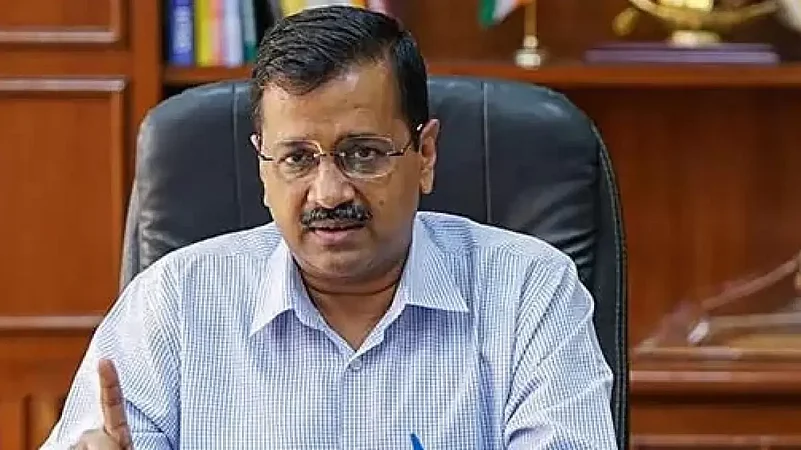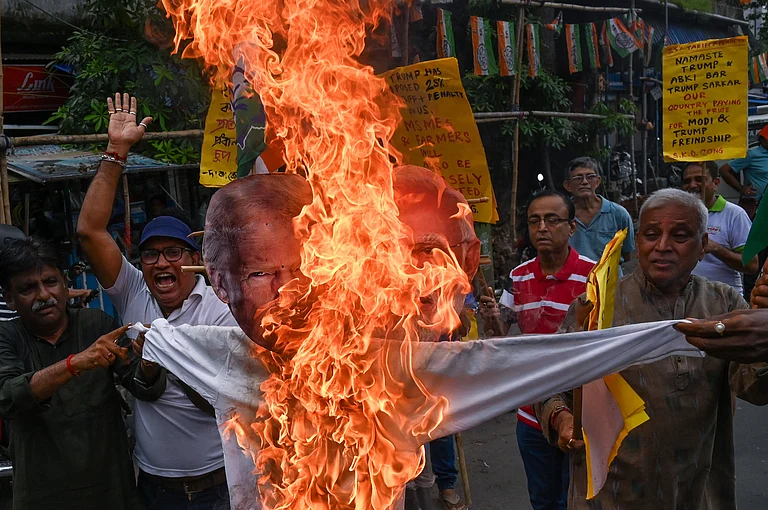Delhi Chief Minister Arvind Kejriwal chaired a meeting on Friday to review the Covid-19 situation in the Union Territory (UT) and said the Government of Delhi was "prepared to face any eventuality".
Only three deaths have been reported over the last four-five days. In all three patients, co-morbidities were "very severe" and it has been assessed that the fatality was due to co-morbidities and perhaps Covid was "incidental", but one can't say that, said Kejriwal.
Addressing reporters after the meeting, Kejriwal, however, said there was no need to worry as of now and that the city government was taking all required steps.
Delhi recorded 295 fresh Covid-19 cases on Thursday with a positivity rate of 12.48, according to data shared by the Health Department.
On Wednesday, the city had logged 300 cases, the first time since August 31, while the positivity rate had mounted to 13.89 per cent. Two Covid-related deaths were also reported on Wednesday.
What do we know of Delhi's Covid situation?
Despite the high positivity rate, the Delhi government has urged citizens not to panic, as tests are being conducted in small numbers. The government has also assured the public that it is taking all necessary measures to contain the spread of the virus and provide timely medical attention to those in need, the health department said in a statement.
"We reviewed the situation today during the meeting. We have asked hospitals to advise coronavirus tests to those who are symptomatic. People visiting hospitals should wear masks," said Health Minister Saurabh Bharadwaj.
Bharadwaj also said genome sequencing of samples found positive during testing, is also being carried out, but "nothing worrisome" has been found till now.
Sharing details on the two deaths reported on Wednesday, the health minister said they were elderly patients, aged 77 and 65, who had comoribidities, and were not at Delhi government-run hospitals.
One was admitted at the Norhtern Railway Hospital and the other at Maharaja Agrasen Hospital, he said, adding, both were admitted in ICUs. Both had comorbdities, besides Covid, one had a kidney disease and the other had a heart ailment, he said.
In both cases, it can be said that primary cause of death was not coronavirus, Bharadwaj told reporters.
If anyone suffers acute respiratory distress syndrome (ARDS) then the system goes on alert that Covid may cause fatality. But, such a case has not come up, "so it is not a panic situation", he said.
The advisory that was issued recently by the Delhi government will be in place, and "we are also monitoring, how this new variant is behaving or growing in other states", the minister said.
"We are closely monitoring it, and soon as we find anything, we will also issue another advisory," he said, adding, "we will increase testing on a need basis".
With the new cases, Delhi's COVID-19 tally increased to 20,09,361 on Wednesday, while the death toll due to the viral infection stood at 26,526.
Fifty-four of the 7,986 beds are occupied in the dedicated COVID-19 hospitals in the city, while 452 patients are in home isolation, the health department said on Wednesday.
The city has been witnessing an increase in the number of daily Covid cases over the last few days amid a sharp rise in H3N2 influenza cases in the country.
The number of fresh cases had seen a decline over the last few months in Delhi. It had dropped to zero on January 16, the first time since the pandemic broke out.
Health Minister Bhardwaj during the briefing also emphasised the need for early detection to curb the spread of the virus.
He shared information about the daily sewage testing being conducted in Delhi to detect any signs of the virus. "We have been testing the sewage in Delhi for the last two-three weeks, and we have been getting signs of Corona," he said.
"Early detection is key in curbing the spread of the virus, and we are leaving no stone unturned in our efforts to detect any potential outbreaks," the minister added.
The Minister also spoke about the advisory issued by the central government, which highlighted six states where COVID-19 cases are increasing -- Maharashtra, Gujarat, Telangana, Tamil Nadu, Kerala, and Karnataka.
He noted that there is a pattern to the spread of the virus in metropolitan areas, such as Mumbai and Delhi, with cases often increasing in Delhi a few weeks after a surge in Maharashtra. As both cities are major hubs for international travel, he urged citizens to continue following Covid-19 guidelines and protocols to prevent further spread of the virus.
During the Thursday meeting, hospital administration was instructed to maintain its preparations with full promptness. If needed, the number of Covid-19 beds can be increased to several thousand using the resources of the hospitals and its surroundings, as was done during the previous surge in cases, the statement said.
Bhardwaj emphasised the importance of wearing masks for those with flu-like symptoms or those visiting hospitals.
He added that the city government had already conducted a mock drill to review the preparations regarding oxygen cylinders and LMOs within Delhi.
What have experts said?
Experts have said that XBB.1.16 variant could be driving the rise in cases in areas like Delhi.
The XBB.1.16 variant is a recombinant —a mixture, simply speaking— strain of BA.2.10.1 and BA.2.75 sublineages, according to WHO.
The WHO notes that XBB.1.16 was first documented on January 23. It is currently designated as a variant under monitoring along with other variants.
Notably, BA.2.10.1 and BA.2.75 are both sub-variants of highly transmissible variants of Omicron. Recently, another sub-variant of Omicron named BF.7 was believed to be fuelling the deadly Covid-19 wave in China.
Experts have said that one should take regular Covid-16 precautions. Dr Jugal Kishore, head of the medicine department at the Centre-run Safdarjung Hospital in Delhi, earlier said that Covid has become "similar to influenza" where the virus undergoes change every year and infects people.
"Omicron infected more than 95 per cent of the population. People have developed antibodies against it and chances of infection from the same variant are less unless the surface antigens change. XBB.1.16, a variant of Omicron, which originated in Japan and was found in China and Singapore, could be behind the rise in cases (in India)," said Kishore.
It has a high transmissibility and cases are likely to increase, but there won't be many deaths, the doctor said, adding that an increase in testing will reflect the increase in number.
Dr Kishore, however, cautioned people with comorbidities and those who have a severe illness, saying they are at a higher risk. He feared there could be mortality in these cases.
"People who have not taken a booster vaccine dose should take it, especially those who have people with comorbidities or patients in their families," he said.
Dr Richa Sareen, a consultant in pulmonology at Fortis hospital here, earlier said, "I feel the rise in Covid cases is led by the new variant. But XBB.1.16 is a variant of Omicron and so there shouldn't be much to worry about as most people have developed antibodies over time, especially after the last wave driven by Omicron," she said.
However, there's a need to exercise caution and people should wear masks in crowded places, she said, adding that those who are immunocompromised or have comorbidities should be extra careful.
Former AIIMS director Dr Randeep Guleria on Wednesday said the XBB.1.16 variant could be driving the recent rise but emphasised there was no need for panic as long it does not cause severe illness and deaths.
Dr Guleria said any virus evolves over time and this has happened with both Covid and influenza.
This is what is called antigenic drift, he said.
It will gradually evolve, mutate a little bit and new variants will emerge, Guleria added.
(With PTI inputs)


























